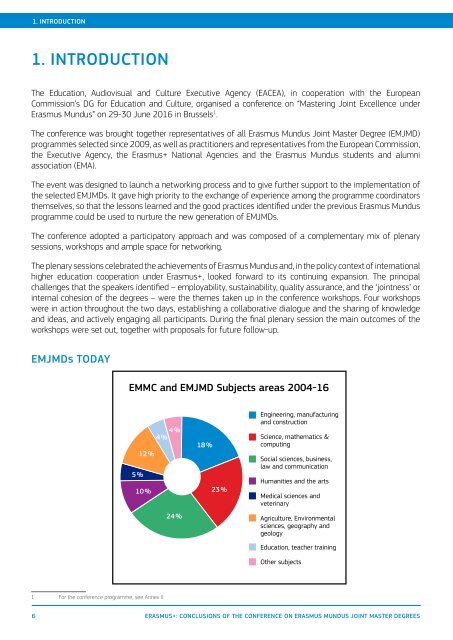Erasmus+
2kWLqbT
2kWLqbT
You also want an ePaper? Increase the reach of your titles
YUMPU automatically turns print PDFs into web optimized ePapers that Google loves.
1. INTRODUCTION<br />
1. INTRODUCTION<br />
1. INTRODUCTION<br />
The Education, Audiovisual and Culture Executive Agency (EACEA), in cooperation with the European<br />
Commission’s DG for Education and Culture, organised a conference on “Mastering Joint Excellence under<br />
Erasmus Mundus” on 29-30 June 2016 in Brussels 1 .<br />
The conference was brought together representatives of all Erasmus Mundus Joint Master Degree (EMJMD)<br />
programmes selected since 2009, as well as practitioners and representatives from the European Commission,<br />
the Executive Agency, the <strong>Erasmus+</strong> National Agencies and the Erasmus Mundus students and alumni<br />
association (EMA).<br />
The event was designed to launch a networking process and to give further support to the implementation of<br />
the selected EMJMDs. It gave high priority to the exchange of experience among the programme coordinators<br />
themselves, so that the lessons learned and the good practices identified under the previous Erasmus Mundus<br />
programme could be used to nurture the new generation of EMJMDs.<br />
The conference adopted a participatory approach and was composed of a complementary mix of plenary<br />
sessions, workshops and ample space for networking.<br />
The plenary sessions celebrated the achievements of Erasmus Mundus and, in the policy context of international<br />
higher education cooperation under <strong>Erasmus+</strong>, looked forward to its continuing expansion. The principal<br />
challenges that the speakers identified – employability, sustainability, quality assurance, and the ‘jointness’ or<br />
internal cohesion of the degrees – were the themes taken up in the conference workshops. Four workshops<br />
were in action throughout the two days, establishing a collaborative dialogue and the sharing of knowledge<br />
and ideas, and actively engaging all participants. During the final plenary session the main outcomes of the<br />
workshops were set out, together with proposals for future follow-up.<br />
EMJMDs TODAY<br />
EMMC and EMJMD Subjects areas 2004-16<br />
The Erasmus Mundus programme was launched in 2004. It has become, as one plenary speaker put it at the<br />
conference, an effective ‘instrument of public diplomacy’, strengthening the links between the countries of the<br />
EHEA and their partners.<br />
200<br />
100<br />
0<br />
France<br />
EMMC and EMJMD Coordinators and Partners<br />
Top 10 Programme Countries 2004-16<br />
Spain<br />
Belgium<br />
Germany<br />
Associated partners<br />
Netherlands<br />
Italy<br />
United Kingdom<br />
In 2014, Erasmus Mundus was integrated into the <strong>Erasmus+</strong> umbrella framework. For the European Union,<br />
which has designed, steered and funded it over the years, the programme represents a successful policy<br />
initiative. So much so that Member State governments, which lent it strong support through the legislative<br />
process, have largely stood back and allowed it to go from strength to strength, gathering momentum and<br />
prestige.<br />
EHEA ministers, for their part, regard joint programmes as major contributors to the implementation of the<br />
Bologna Process. This much became evident when they met in Yerevan in 2015 2 . In the areas of employability,<br />
student-centred learning and social inclusion, the expectations placed on Erasmus Mundus are high.<br />
Portugal<br />
Denmark<br />
Full partners and coordinators<br />
Sweden<br />
5 %<br />
12 %<br />
10 %<br />
4 %<br />
4 %<br />
24 %<br />
18 %<br />
23 %<br />
Engineering, manufacturing<br />
and construction<br />
Science, mathematics &<br />
computing<br />
Social sciences, business,<br />
law and communication<br />
Humanities and the arts<br />
Medical sciences and<br />
veterinary<br />
Agriculture, Environmental<br />
sciences, geography and<br />
geology<br />
Education, teacher training<br />
50<br />
25<br />
0<br />
United States<br />
EMMC and EMJMD Partners<br />
Top 10 Partner Countries 2004-16<br />
Brazil<br />
China (Pep Rep of)<br />
Australia<br />
South Africa<br />
India<br />
Canada<br />
Japan<br />
Russian Fed<br />
Switzerland<br />
Other subjects<br />
Full partners only<br />
Associated partners<br />
1 For the conference programme, see Annex II<br />
2 See the Ministerial Communiqué at http://www.ehea.info/Uploads/SubmitedFiles/5_2015/112705.pdf<br />
6 ERASMUS+: CONCLUSIONS OF THE CONFERENCE ON ERASMUS MUNDUS JOINT MASTER DEGREES<br />
ERASMUS+: CONCLUSIONS OF THE CONFERENCE ON ERASMUS MUNDUS JOINT MASTER DEGREES<br />
7


